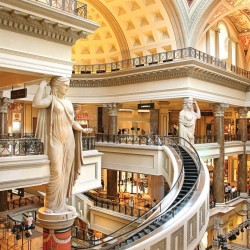Activist investor Carl Icahn, who owns a 10% stake in Caesars Entertainment, wants the company to sell itself to other casino companies. After the Wall Street Journal issued a report on Icahn’s preference, Caesars Entertainment shares jumped 6%.
It is a transitional period for Caesars Entertainment. Mark Frissora, the company’s chief executive, left the company on February 8.
Two competitors — Eldorado Resorts and Tilman Fertitta’s Golden Nugget — have approached Caesars about a merger.
Media rumors have swirled that a third competitor, MGM Resorts, is interested in a buyout.
Caesars’ board rejected the bid from Golden Nugget, while the Eldorado Resorts bid stalled in the early stages of negotiations. Those discussions have not stopped the speculation that Caesars is on the market.
Carl Icahn Proxy Fight?
CNBC reported that other Caesars shareholders recruited Carl Icahn to lobby for a sale, which he was happy to do. Next week could be the pivotal week. Icahn has to decide by March 1 whether to launch a proxy fight for control of the company, according to the Wall Street Journal.
The decision comes amidst a report that Caesars’ 2018 losses were mainly the result of its continue bankruptcy reorganization plan.
The poor showing in 2018 led to Frissora’s impending departure from the company — announced in November for February, but recently pushed back until April — prior to the announcement Carl Icahn was buying a position in the Las Vegas Strip company.
It certainly would not be the first time Carl Icahn has launched a takeover of a company — or even a casino company.
Caesars Entertainment Profile
Caesars Entertainment is one of the world’s largest casino companies. It owns 50 casinos spread throughout the United States and four other countries. In fact, Caesars owns more US casino resorts than any other company.
Caesars’ market value is estimated to be $6 billion. Mark Frissora and his predecessor, Gary Loveman, captained Caesars through the bankrupty of its operations division, CEOC, and through a bitter reorganization battle with junior shareholders.
Now the company appears ready to launch a new era, but it still deals with billions of debt. Many gaming and finance experts — and a good number of Caesars shareholders — believe a merger or buyout is the best option for the company.
Caesars’ Japanese Casino Bid
In the latter stages of the Frissora era, Caesars Entertainment dabbled with submitting a license application for a Japanese integrated casino resort. Japan is the third largest economy on Earth, so winning a casino license there would be a huge boon for Caesars.
To avoid falling behind competitors, many believe the company must avoid the same pattern that happened from 2002 to 2004, when Caesars (then Harrah’s) saw its three main Las Vegas Strip rivals — MGM Resorts, Wynn Resorts, and Las Vegas Sands — secure Macau casino licenses.
To compete in the most competitive casino bidding process in over a decade, Caesars Entertainment might need to solve its perennial debt concerns and consolidate its market position with a buyout or a merger. The resulting entity might have the resources and reputation to win a Japanese casino license. Japan plans to issue three licenses in 2020.
Carl Icahn’s Interest in Caesars
Carl Icahn’s interest in Caesars Entertainment is certain to impress investors. Few can rival Icahn’s 50-year history as an activist investor. In the 1980s, Carl Icahn was considered a corporate raider.
In the past 20 years, though, Icahn has been at the center of several casino turnarounds. He bought Stratosphere out of bankruptcy in the 1990s and sold it for a huge profit ten years later. He bought Tropicana Entertainment in 2010 and effected a 5-year turnaround, then sold the company last year for a huge profit.
Icahn had less success with Trump Entertainment, but the fact is he knows the casino industry well. If Carl Icahn believes in Caesars Entertainment’s future, then many shareholders and other traders do, as well.

